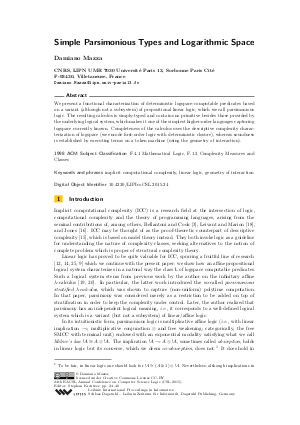Simple Parsimonious Types and Logarithmic Space
Author Damiano Mazza
-
Part of:
Volume:
24th EACSL Annual Conference on Computer Science Logic (CSL 2015)
Part of: Series: Leibniz International Proceedings in Informatics (LIPIcs)
Part of: Conference: Computer Science Logic (CSL) - License:
 Creative Commons Attribution 3.0 Unported license
Creative Commons Attribution 3.0 Unported license
- Publication Date: 2015-09-07
File

PDF
LIPIcs.CSL.2015.24.pdf
- Filesize: 0.59 MB
- 17 pages
Document Identifiers
Subject Classification
Keywords
- implicit computational complexity
- linear logic
- geometry of interaction
Metrics
- Access Statistics
-
Total Accesses (updated on a weekly basis)
0PDF Downloads0Metadata Views
Abstract
We present a functional characterization of deterministic logspace-computable predicates based on a variant (although not a subsystem) of propositional linear logic, which we call parsimonious logic. The resulting calculus is simply-typed and contains no primitive besides those provided by the underlying logical system, which makes it one of the simplest higher-order languages capturing logspace currently known. Completeness of the calculus uses the descriptive complexity characterization of logspace (we encode first-order logic with deterministic closure), whereas soundness is established by executing terms on a token machine (using the geometry of interaction).
Cite As Get BibTex
Damiano Mazza. Simple Parsimonious Types and Logarithmic Space. In 24th EACSL Annual Conference on Computer Science Logic (CSL 2015). Leibniz International Proceedings in Informatics (LIPIcs), Volume 41, pp. 24-40, Schloss Dagstuhl – Leibniz-Zentrum für Informatik (2015)
https://doi.org/10.4230/LIPIcs.CSL.2015.24
BibTex
@InProceedings{mazza:LIPIcs.CSL.2015.24,
author = {Mazza, Damiano},
title = {{Simple Parsimonious Types and Logarithmic Space}},
booktitle = {24th EACSL Annual Conference on Computer Science Logic (CSL 2015)},
pages = {24--40},
series = {Leibniz International Proceedings in Informatics (LIPIcs)},
ISBN = {978-3-939897-90-3},
ISSN = {1868-8969},
year = {2015},
volume = {41},
editor = {Kreutzer, Stephan},
publisher = {Schloss Dagstuhl -- Leibniz-Zentrum f{\"u}r Informatik},
address = {Dagstuhl, Germany},
URL = {https://drops.dagstuhl.de/entities/document/10.4230/LIPIcs.CSL.2015.24},
URN = {urn:nbn:de:0030-drops-54053},
doi = {10.4230/LIPIcs.CSL.2015.24},
annote = {Keywords: implicit computational complexity, linear logic, geometry of interaction}
}
Author Details
References
-
Beniamino Accattoli and Ugo Dal Lago. Beta reduction is invariant, indeed. In Proceedings of CSL-LICS, page 8, 2014.

-
Patrick Baillot and Damiano Mazza. Linear logic by levels and bounded time complexity. Theor. Comput. Sci., 411(2):470-503, 2010.

-
Stephen Bellantoni and Stephen A. Cook. A new recursion-theoretic characterization of the polytime functions. Computational Complexity, 2:97-110, 1992.

-
Guillaume Bonfante. Some programming languages for logspace and ptime. In Proceedings of AMAST, pages 66-80, 2006.

-
Ugo Dal Lago. Context semantics, linear logic, and computational complexity. ACM Trans. Comput. Log., 10(4), 2009.

-
Ugo Dal Lago and Ulrich Schöpp. Functional programming in sublinear space. In Proceedings of ESOP, pages 205-225, 2010.

-
Ugo Dal Lago and Ulrich Schöpp. Type inference for sublinear space functional programming. In Proceedings of APLAS, pages 376-391, 2010.

-
Vincent Danos and Laurent Regnier. Reversible, irreversible and optimal lambda-machines. Theor. Comput. Sci., 227(1-2):79-97, 1999.

-
Marco Gaboardi, Jean-Yves Marion, and Simona Ronchi Della Rocca. An implicit characterization of PSPACE. ACM Trans. Comput. Log., 13(2):18, 2012.

-
Marco Gaboardi, Luca Roversi, and Luca Vercelli. A by-level analysis of multiplicative exponential linear logic. In Proceedings of MFCS, pages 344-355, 2009.

-
Jean-Yves Girard. Geometry of interaction I: Interpretation of system F. In Proccedings of Logic Colloquium 1988, pages 221-260, 1989.

-
Jean-Yves Girard. Light linear logic. Inf. Comput., 143(2):175-204, 1998.

-
Martin Hofmann. A mixed modal/linear lambda calculus with applications to bellantoni-cook safe recursion. In Proceedings of CSL, pages 275-294, 1997.

-
Martin Hofmann. Linear types and non-size-increasing polynomial time computation. Inf. Comput., 183(1):57-85, 2003.

-
Neil Immerman. Descriptive complexity. Graduate texts in computer science. Springer, 1999.

-
Neil D. Jones. Logspace and ptime characterized by programming languages. Theor. Comput. Sci., 228(1-2):151-174, 1999.

-
Lars Kristiansen. Neat function algebraic characterizations of logspace and linspace. Computational Complexity, 14(1):72-88, 2005.

-
Daniel Leivant and Jean-Yves Marion. Lambda calculus characterizations of poly-time. Fundam. Inform., 19(1/2), 1993.

-
Damiano Mazza. An infinitary affine lambda-calculus isomorphic to the full lambda-calculus. In Proceedings of LICS, pages 471-480, 2012.

-
Damiano Mazza. Non-uniform polytime computation in the infinitary affine lambda-calculus. In Proceedings of ICALP, Part II, pages 305-317, 2014.

-
Damiano Mazza and Kazushige Terui. Parsimonious types and non-uniform computation. In Proceedings of ICALP, Part II, pages 350-361, 2015.

-
Peter Møller Neergaard. A functional language for logarithmic space. In Proceedings of APLAS, pages 311-326, 2004.

-
Ramyaa Ramyaa and Daniel Leivant. Ramified corecurrence and logspace. Electr. Notes Theor. Comput. Sci., 276:247-261, 2011.

-
Ulrich Schöpp. Space-efficient computation by interaction. In Proceedings of CSL, pages 606-621, 2006.

-
Ulrich Schöpp. Stratified bounded affine logic for logarithmic space. In Proceedings of LICS, pages 411-420, 2007.

-
Kazushige Terui. Proof nets and boolean circuits. In Proceedings of LICS, pages 182-191, 2004.

